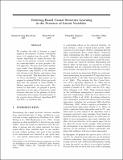Ordering-Based Causal Structure Learning in the Presence of Latent Variables
Author(s)
Bernstein, Daniel Irving; Saeed, Basil(Basil N.); Squires, Chandler(Chandler B.); Uhler, Caroline
DownloadPublished version (1.165Mb)
Publisher Policy
Publisher Policy
Article is made available in accordance with the publisher's policy and may be subject to US copyright law. Please refer to the publisher's site for terms of use.
Terms of use
Metadata
Show full item recordAbstract
We consider the task of learning a causal graph in the presence of latent confounders given i.i.d.samples from the model. While current algorithms for causal structure discovery in the presence of latent confounders are constraint-based, we here propose a hybrid approach. We prove that under assumptions weaker than faithfulness, any sparsest independence map (IMAP) of the distribution belongs to the Markov equivalence class of the true model. This motivates the Sparsest Poset formulation - that posets can be mapped to minimal IMAPs of the true model such that the sparsest of these IMAPs is Markov equivalent to the true model. Motivated by this result, we propose a greedy algorithm over the space of posets for causal structure discovery in the presence of latent confounders and compare its performance to the current state-of-the-art algorithms FCI and FCI+ on synthetic data.
Date issued
2020-08Department
Massachusetts Institute of Technology. Department of Electrical Engineering and Computer Science; Massachusetts Institute of Technology. Laboratory for Information and Decision Systems; Massachusetts Institute of Technology. Institute for Data, Systems, and SocietyJournal
Proceedings of Machine Learning Research
Publisher
International Machine Learning Society
Citation
Bernstein, Daniel Irving et al. “Ordering-Based Causal Structure Learning in the Presence of Latent Variables.” Paper in the Proceedings of Machine Learning Research, 108, 23rdInternational Conference on Artificial Intelligence and Statistics (AISTATS) 2020, Online, August 26 - 28, 2020, International Machine Learning Society: 4098-4108 © 2020 The Author(s)
Version: Final published version
ISSN
2640-3498